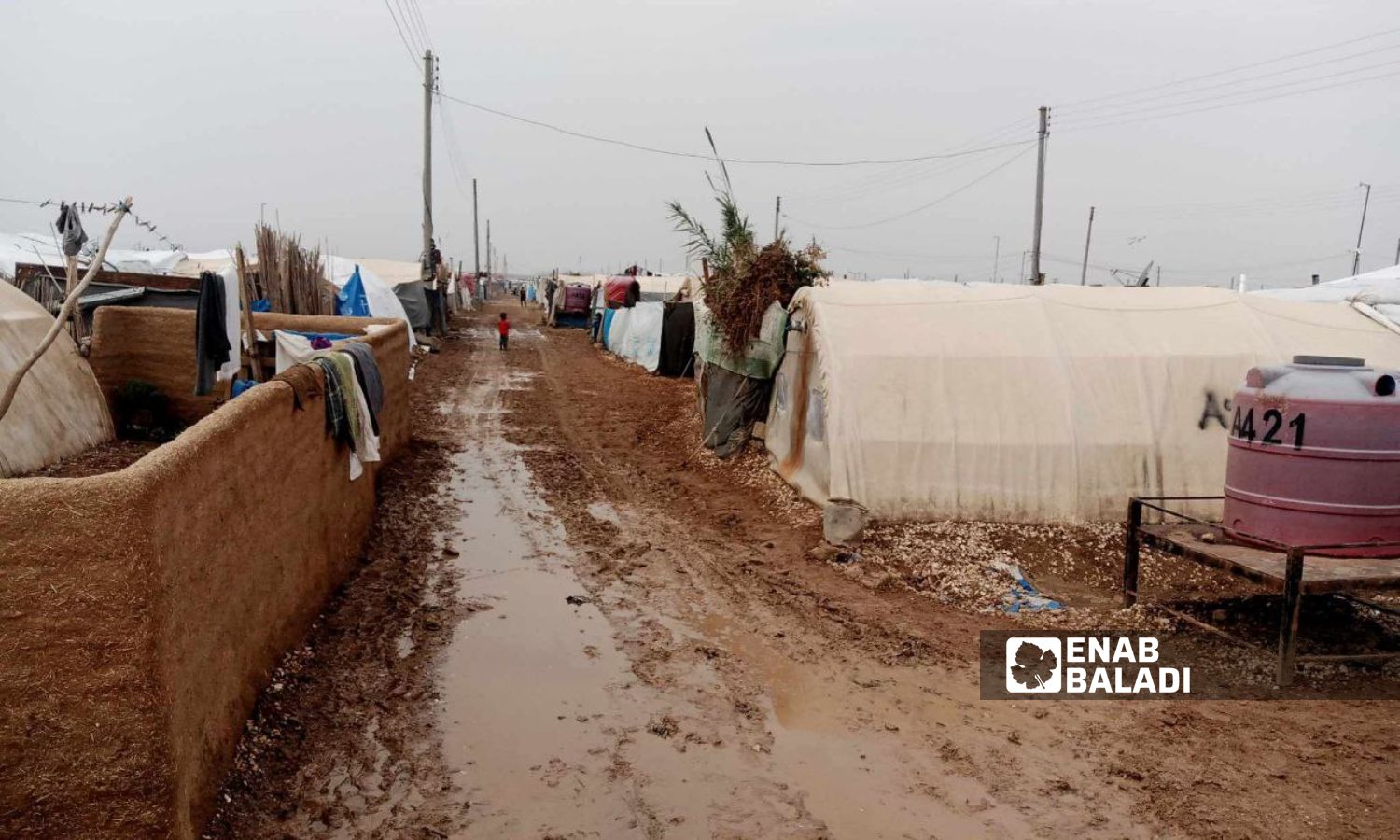



Al-Hasakah – Majd al-Salem
Displaced people in al-Tuwina camp in northwest al-Hasakah governorate face challenges imposed by the winter season, which add to their complicated living conditions as winter approaches.
Families in temporary tents are subjected to cold from every corner, and the lack of infrastructure in the camp makes winter a harsh season that brings troubles despite its many blessings.
Mohammed al-Alo, 30, who has been living in the camp for five years and hails from the city of Ras al-Ain, told Enab Baladi that the only makeshift solution to confront the cold in the camp is “wrapping up in the blanket,” which they never part with, as the tents are worn out and have not been replaced for several years and “do not protect against the winter cold or the summer heat.”
The situation becomes more difficult at night with further temperature drops, according to al-Alo, adding that attempts to repair the tents are not sufficient and costly, as each tent needs to purchase rainproof insulation at about 400,000 Syrian pounds, and it is bought from outside the camp at the expense of the displaced individuals.
The tent needs a heater that operates around the clock, provided there is fuel (diesel) to overcome the cold.
However, the camp suffers from a severe shortage of fuel and a decrease in the quantities allocated to each family.
Majul, 45, who requested not to disclose his full name for security reasons and is a resident of the camp, told Enab Baladi that the allocation is 35 liters for every two tents for a week.
This amount is less than that allocated last year by about 10 liters, and yet some have not received their allocations, or there are delays in distribution.
Many in the camp use a single heater, often only at night, as “all family members, including women and children, huddle in one tent for the sake of saving,” Majul said.
He further told Enab Baladi that they fear the situation deteriorating in case of snowfall and the formation of frost or heavy rain leading to the formation of floods due to the tents’ weakness and poor infrastructure in the camp.
Up until the preparation of this report, the camp’s residents have not received specific winter aid, such as the distribution of heaters and their accessories or blankets.
He added that some of the displaced buy fuel from the black market outside the camp at a price of 5000 Syrian pounds per liter, which is extremely expensive.
Another problem faced by the camp’s residents, as observed by Enab Baladi, is the poor condition of the roads that separate the tents and sectors, often paved with gravel or dirt roads that turn into muddy roads with the first rainfall, making mobility difficult.
The state of the roads makes the residents resemble prisoners, making it difficult for those working in the camp to enter or leave, and the situation becomes even worse for the elderly and people with disabilities, as well as for children and school students who suffer from a lack of fuel and cold inside the classrooms.
Camp director Malak Saleh stated in statements to the local “Sawt al-Hayat” radio on December 7 that the displaced face several difficulties at the beginning of winter.
These difficulties include not replacing the tents since 2019, and relying on makeshift solutions by maintaining the dilapidated tents.
In addition, there is a reduction in the fuel allocations for families, with each family receiving only four liters, which is an insufficient quantity, according to Saleh.
Al-Tuwina camp is located in the northwest of al-Hasakah province, managed by the Autonomous Administration of North and East Syria (AANES), and is home to about 16,000 people, most of whom are from the city of Ras al-Ain and its southern countryside, as well as from the town of Abu Rasin and its countryside, and the surrounding villages of Tel Tamr to the north and northwest.
if you think the article contain wrong information or you have additional details Send Correction